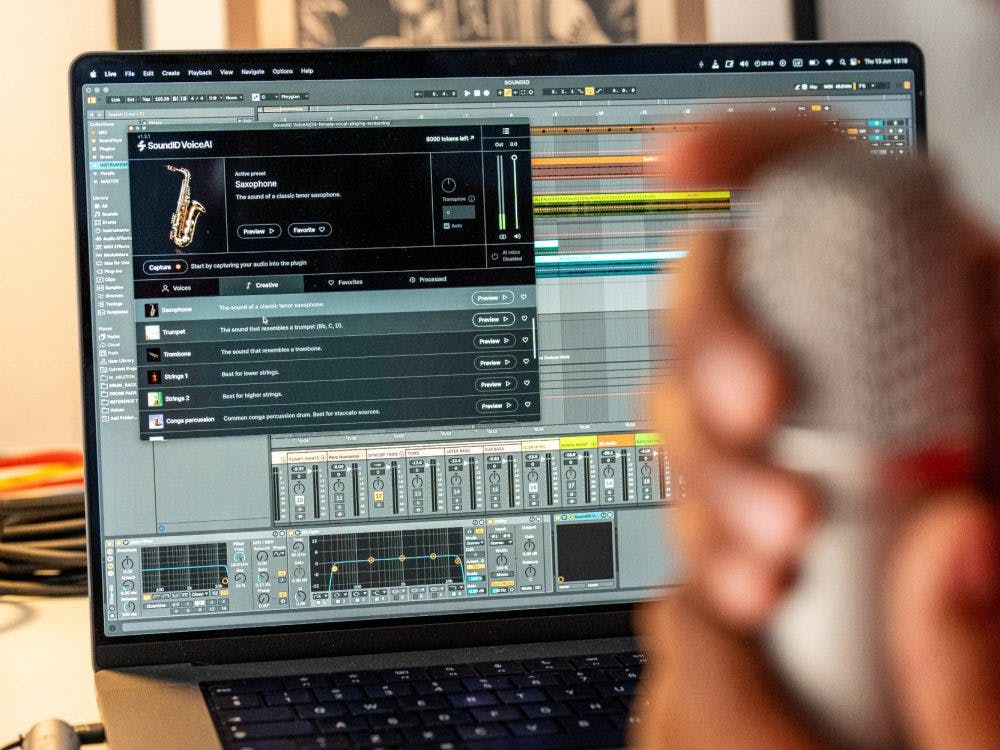AI can help music producers spark new creative ideas by serving as a collaborative partner that generates unexpected musical elements, breaks through creative blocks, and explores new sonic territories. From melody generators and chord progression assistants to rhythm creators and vocal processors, artificial intelligence provides fresh starting points and alternative approaches that expand your creative palette without replacing your artistic vision.
Why AI is changing how music producers approach creativity
AI music production tools are transforming the creative process by acting as an intelligent collaborator rather than a replacement for human creativity. These systems analyse vast amounts of musical data to suggest patterns, harmonies, and arrangements you might not have considered.
The shift represents a fundamental change in how we approach creative music technology. Instead of staring at a blank DAW project, you can now input a simple vocal melody or hum a tune, and AI tools will transform it into full instrumentation or backing vocals. This approach speeds up the ideation phase and helps you move from concept to creation more efficiently.
Modern AI composition software learns from your input style and preferences, offering suggestions that feel natural to your workflow. The technology works best when you maintain creative control whilst leveraging AI’s ability to generate unexpected combinations and variations.
What types of AI tools help music producers generate new ideas?
Several categories of AI songwriting tools can enhance your creative process, each serving different aspects of music production. These tools range from melody generators to complete vocal processing systems.
Melody and chord progression generators analyse harmonic relationships to suggest new musical ideas. These tools can take a simple input and expand it into full arrangements, helping you explore musical territories outside your usual style.
AI beat making tools create drum patterns and rhythmic elements by learning from various genres and styles. They can suggest unexpected rhythm combinations that add fresh energy to your tracks.
Vocal processing AI represents one of the most advanced applications. Tools like voice transformation plugins can convert your humming into professional-sounding vocals or transform a single voice into multiple backing vocal tracks. These systems can even convert vocal melodies into instrument sounds, turning your voice into guitars, strings, or brass sections.
Lyric writing assistants help overcome writer’s block by suggesting rhymes, themes, and complete verses based on your initial ideas or mood preferences.
How does AI help overcome creative blocks in music production?
Creative blocks often stem from falling into familiar patterns or feeling overwhelmed by infinite possibilities. Machine learning music tools break these cycles by introducing unexpected elements and fresh perspectives.
When you’re stuck on chord progressions, AI can analyse your existing work and suggest harmonic variations you hadn’t considered. These suggestions often combine familiar elements in new ways, maintaining musical coherence whilst adding surprise.
AI excels at generating starting points from minimal input. You can hum a melody into your laptop’s microphone, and AI tools will transform it into studio-quality vocals or instrument tracks. This immediate transformation from idea to polished sound helps maintain creative momentum.
The technology also helps by offering multiple variations of the same idea. Instead of committing to your first instinct, you can explore several AI-generated alternatives, choosing elements from each to create something entirely new.
Can AI actually improve your songwriting process?
AI significantly enhances the songwriting workflow by accelerating the exploration phase and offering alternative arrangements you might not discover through traditional methods. The key lies in understanding how to integrate these tools effectively.
The technology excels at rapid prototyping. You can quickly test different vocal styles, create demo versions with various voice timbres, or generate backing vocals that would typically require multiple recording sessions. This speed allows you to experiment more freely without the pressure of perfect execution.
AI tools help you explore genres and styles outside your comfort zone by providing authentic-sounding elements from different musical traditions. This cross-pollination often leads to unique hybrid styles that distinguish your work.
The collaborative aspect proves particularly valuable during the arrangement phase. AI can suggest instrumental parts that complement your existing tracks, helping you build fuller, more dynamic productions without requiring expertise in every instrument.
What should music producers know before using AI creative tools?
Understanding AI limitations helps you use these tools more effectively whilst maintaining your artistic authenticity. AI works best as a creative catalyst rather than a complete solution.
Quality input produces quality output. Clean, dry recordings without excessive processing or reverberation yield the best results. Polyphonic sources, heavily distorted audio, or extremely processed signals may produce unpredictable outcomes.
Consider your workflow integration carefully. Choose tools that work seamlessly within your DAW environment and don’t disrupt your creative flow. Plugin-based solutions often provide better integration than standalone applications.
Balance is important between AI assistance and human creativity. Use AI to generate ideas and starting points, but apply your musical judgment to refine and personalise the results. The most compelling music emerges when AI suggestions meet human artistic vision.
Privacy and ownership matter when selecting AI tools. Ensure you understand the terms regarding your created content and choose platforms that protect your intellectual property rights.
AI music production represents an exciting frontier that amplifies human creativity rather than replacing it. By understanding these tools’ capabilities and limitations, you can harness artificial intelligence music technology to expand your creative horizons and develop your unique sound. We’re committed to developing AI solutions that enhance your creative process whilst maintaining the authenticity that makes your music distinctly yours.
If you’re ready to get started, check out VoiceAI today.



